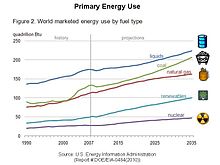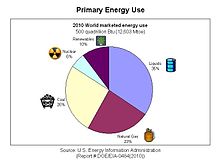Energy (technology)
From the social and economic point of view, energy is a primary or derived natural resource that allows work to be done or serves as a subsidiary to economic activities independent of energy production. Since all forms of energy once converted to the proper form are basically equivalent, all energy production in its various forms can be measured in the same units. One of the most common units is the equivalent ton of coal which is equivalent to:29.3·109 joules or 8138.9 kWh.
- Sound energy: energy derived from mechanical vibration.
- Radiant energy: The existing one in a physical environment, caused by electromagnetic waves, through which it spreads directly without movement of matter
Electrical energy
During the 20th century, chemical fuels and electricity were the two most commonly used forms of energy. The second form allows economic transport to the points of consumption. However, the electrical energy used today is almost always a secondary form of energy, obtained from some other primary form of energy or energy technology among these forms are:
- Atomic or nuclear energy: strong nuclear force
- Renewable energies:
- Wind energy
- Geothermal energy
- Hydraulic energy
- Mareomotric energy
- Solar energy
- kinetic energy
- Biomass
- Ocean thermal gradient
- Blue energy
- Thermoelectric power generated by thermocouples
- Nuclear fusion energy
- Non-renewable (or nuclear- fossil) sources of energy:
- Coal
- Nuclear power stations
- Natural gas
- Oil
Exploitation of energy
The exploitation of energy encompasses a series of processes, which vary according to the source used:
- Extraction raw material (uranium, coal, oil, etc.).
- Processing of raw material (uranium enrichment, petroleum refining, etc.).
- Transport, storage and distribution to the point of use.
- Transformation energy (by combustion, fission, etc.).
For electricity, in addition:
- Generation of electrical energyusually through turbines.
- Storage or distribution of energy.
- Consumption.
Finally:
- Management of waste.
Energy economy
The availability of energy is a fundamental factor for development and economic growth. The appearance of an energy crisis inevitably leads to an economic crisis. The efficient use of energy, as well as its responsible use, are essential for sustainability.
In the current world situation, there are several voices that advocate reducing energy consumption and natural resources.
- Report on the limits of the development of the Club of Rome (1972).
- Hubbert's peak theory, about oil depletion.
Units of energy measurement
- Caloria It is the amount of energy needed to raise the temperature of a gram of water from 14.5 to 15.5 degrees Celsius.
- Refrigeration is the energy unit used in refrigeration and is equivalent to absorbing heat.
- Almost disused, it is equal to 1 million calories or 1 Mcal.
- Kilowatt hour (kWh) usually used in electricity. And its derivatives MWh, MW year.
- July = 0.24 calories.
- Large calorie used in Biology/Food and Nutrition = 1 Cal = 1 kcal = 1,000 lime.
- Petroleum equivalent to 41,840,000 Julys = 11,622 kWh.
- Coal equivalent ton of 29,300,000 July = 8138.9 kWh.
- Cooling ton.
- BTU, Bristish Thermal Unit.
Chemical energy is what powers our cars, motorcycles, trucks, boats and planes, and we extract it from fossil fuels such as oil, gas or coal, or by making fuels from other energies.
Contenido relacionado
Physical layer
DocBook
Informatics Engineering



